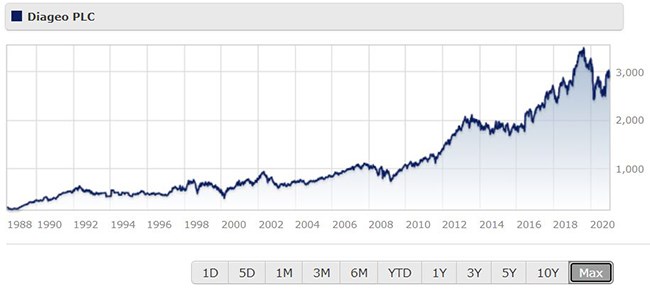
Our stock of the week by a large margin is drinks maker Diageo (DGE), which has just launched an alcohol-free Gordon’s gin in time for Dry January.
You may (or may not) have drunk more during lockdown, but opportunities to imbibe Diageo’s products like Guinness, Smirnoff and Captain Morgan Rum in pubs, night clubs and restaurants have been severely curtailed. And consumer trends are changing – low or no alcohol drinks now make up 33% of the “off” trade, which represents drinks bought from supermarkets and the like and consumed at home. There's growing evidence than younger generations drink less alcohol than their forebears, with the health, sports and nutrition craze part of that lifestyle shift.
Despite the wider stock market rally last year, Diageo shares started January 10% lower than they were at the beginning of 2020 as pandemic restrictions hit sales. Still, Morningstar analysts think the shares are still overvalued at £28.78, with a fair value of £26, and the company has a wide economic moat.
Anlayst Philip Gorham says the beverage industry globally is consolidating, and that plays into the hands of companies like Diageo that have the capital to buy up the smaller players. “Mergers and acquisitions remain part of the firm's DNA, and subsequent transactions – some transformative, others bolt-on – have established Diageo as the global industry leader,” says. This is particularly the case in emerging markets, where premium alcoholic drinks such as whisky are seen as status symbols for a growing affluent class in countries like China and India. Morningstar’s Gorham also notes that – pandemic restrictions aside – drinkers are willing to pay more for premium products, especially ones like whisky which have been “aged”. "The longer the maturing process, the higher the scarcity value and the higher the retail price. Consumers also perceive the aging process to improve the taste and the texture of the beverage," he says, adding that in a competitive market like alcoholic drinks, consumers are more loyal to premium brands like Johnnie Walker than mass market drinks.

That “premiumisation” strategy is one of the key themes for fund manager Nick Train, who holds Diageo in Silver-rated Finsbury Growth & Income Trust (FGT). “Diageo is the best collection of alcoholic beverage brands in one company that exists anywhere in the world. We're lucky that it's a UK company,” he told Morningstar.co.uk last year. Train adds that these brands are still likely to be around in 50 years, providing “permanence and durability” to Diageo and helping it to fend off competitors. Diageo is the third biggest holding in the investment trust's portfolio with a weighting of 9.5%, just behind former stock of the week London Stock Exchange (LSE) and Unilever (ULVR).
Diageo is also prized for its dividend – while the 2% yield is modest by FTSE 100 standards, the company has just maintained a winning streak of increasing dividends since 1999 - and the company only came into being in 1997 with the merger of Grand Metropolitan and Guinness. While the last year has been a tough one for companies like Diageo, in the last 20 years its share price has risen 350%.
Looking ahead to a post-Covid and post-Brexit world, AJ Bell’s investment director Russ Mould sees opportunities for Diageo: “No doubt Diageo is looking forward to the return of duty free shopping, once international travel recovers, and trade deals with other key markets like India and the US that can reduce tariffs there, while its supply chain should be largely unaffected, as most of its raw materials come from domestic sources.”
The company’s first-half results are due on January 28, which will cover the period when the UK (temporarily) came out of lockdown and bars and restaurants re-opened with some restrictions.


























